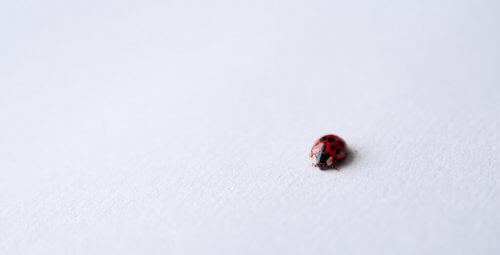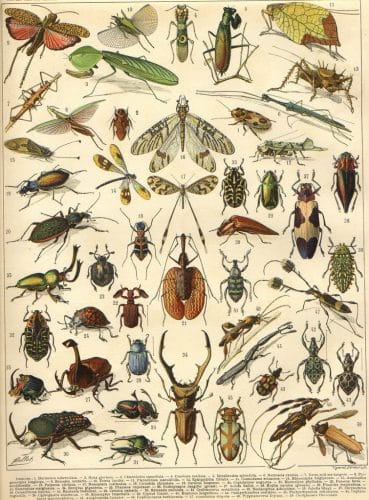A new American study found that even if you clean your house well, there will be hundreds of species of insects in it. How is the situation at your house?

By Alina Arbitman, Angle, Science and Environment News Agency
Most of us spend many hours every day indoors. Our houses guarantee us the illusion of isolation from the environment, but in reality we host many creatures. In fact, it is possible that the rooms of our houses even constitute an ecosystem in itself.
New research About insects in human dwellings conducted in the city of Raleigh in North Carolina, United States, examined how many insects there really are in the houses where we live. The researchers surveyed 50 houses, in the city and in the suburbs, and recorded every arthropod they encountered inside the house, alive or dead.
The investigators found in the houses No less than about 300 families of arthropods, of which they focused on the 50 most common families, which can be divided into two main groups: the first group includes creatures that entered the house by accident or on purpose but were unable to get out and return to their natural environment, this group represents the variety of arthropods that live in the area.
The second group of insects includes less innocent insects, those that choose to live near humans. Many of them are well known to us from Israel as well: ashnorim (the flour moth), which are very fond of grains and dry food found in our kitchen cupboards; fruit flies; Psokaim (booklice) who live inside books; clothes moths, drain gnats, cute little flies that appear in the shower because their larvae develop on organic material in the water pipes; Tails or "silver fish", which usually pierce clothes and books; Small flies from the black fungus gnats family that develop in moist soil in pots inside the house, "trembling" spiders, webs that live in the corners of the house and prey on insects, as well as cockroaches, mosquitoes (mainly house cockroaches, and also large mosquitoes from the gerbil family) and ants.
"In my estimation, if such a study were to be conducted in Israel, it would reach similar results in principle," says Dr. Neta Dorchin, an entomologist from the Department of Zoology at Tel Aviv University. "The prominent species of arthropods that can be seen with the naked eye in most homes in Israel also appeared in the American survey. It is understood that other species will be found, but it is likely that the representation of the different families and series will be similar and the trends will be the same.' She further adds: "There is no doubt that there will be a big difference in the variety of insects in houses in rural areas compared to urban areas and in detached private houses compared to high-rise buildings, so the question is what do you mean when you talk about an average house in Israel."
Not excited about cleaning
One of the most surprising findings in the study was that there was no connection between the variety or amount of insects and the lifestyle of the house's residents, such as the presence of house plants, the presence of pets or the use of pesticides. Although more insects were found in homes with dogs than in homes with cats, a phenomenon familiar to anyone who lives with a cat and has had the chance to watch it actively hunt arthropods, but the trend was not statistically significant. It seems that the insects were also not moved by the cleanliness of the house or the amount of objects in it, with the exception of the trembling spiders, who preferred houses full of objects (perhaps because in such houses it is more difficult to reach the corners of the house, and thus they can weave their webs there without being disturbed).

Is this good news for those of us who prefer other activities to cleaning the house in our spare time? Not so fast. The researchers believe that this finding is related to the composition of the insect populations outside the houses that "seep" into the houses because of their trap effect, and less to insects that accompany humans.
Dr. Moshe Gish, an ecologist who studies insects in the Department of Natural Resources and Environmental Management at the University of Haifa, explains why this would not happen in Israel. "In the city of Raleigh in North Carolina, many of the houses are detached and surrounded by gardens, and the distance between the houses is great. The city is also full of parks, urban nature sites and even large puddles and swamps. Moreover, the climate in the area is sub-tropical with a long and rainy summer season, from April to October, where everything is swarming with insects. Therefore, the composition of insects inside the house is mainly influenced by its trap effect and the effect of the idle lifestyle in the sixty.' He says. "In contrast, in Israel the average person lives in an apartment building in the city and the breeding season for most insects is short. This means that there is no massive entry of insects into the house and in my estimation in such a case we will see mainly insects that specialize in living in the human environment, which are naturally more affected by human activity and lifestyle.'
Should the uninvited roommates worry us? Although there are some harmful insects such as the clothes moth or the flour moth or poisonous arthropods such as the brown-toothed spider, scorpions and oriental wasps (bees) that are dangerous when they nest in protected places such as a closed balcony. But most arthropods are not harmful and there is no reason to be afraid of them: various spiders (besides the previously mentioned tooth), yatoshishim (in the shower), tipola (large mosquitoes that do not bite) and in fact any insect that is not on the list of pests. "Those who have a garden should be happy about all the insects that come to pollinate flowers, such as bees and various flies, and not kill them when they accidentally enter the house," explains Dorchin. "You just have to help them find their way back out."
The American researchers even believe that insects in the house may benefit our health. Exposure to biological diversity is important for the immune system, and it is possible that insects help us by introducing new microorganisms into our homes that they carry on their bodies. "Although I am not an expert on microorganisms, my personal opinion is that the attempt of people today to create a sterile environment for themselves (especially for small children) is wrong for various reasons, and suppressing the immune system is just one of them." Dorchin says. "In many studies it is claimed that exposure to certain foods in childhood prevents the appearance of allergies and this is also the basic principle of vaccination - exposure to small amounts of a pathogen encourages the immune system to produce antibodies against it and then it is able to deal with such pathogens in the future." Gish actually takes issue with the researchers' claim: "This is a far-reaching hypothesis that would be interesting to examine in future research, but today it has no basis in science," he says.
How do you keep the cockroach?

"When insects enter my house it makes me happy - because first and foremost it indicates that there are still such insects in the area. To my dismay, recent studies show that the condition of the insects on Earth is getting worse due to unprecedented human damage to nature," says Gish. The problem is that if many species of insects become extinct, the terrestrial ecosystems in which the insects play key roles could collapse. "You can compare an ecosystem to a brick tower, where each species is a brick," Gish explains. "In an extreme situation of a damaged ecosystem with low species diversity, if you remove one brick from it, there are no other bricks that can carry the load and fulfill the same role, and then the tower collapses."
About a million species (!) of arthropods are known to science, which make up about 80 percent of all the animals on Earth (in terms of the number of individuals), and are a central link in the provision of essential system services that we take for granted: from breaking down waste and conserving water in the soil through crop pollination Farmers and including pest and disease regulation services of plants or humans. For some of the system's services, such as the pollination of agricultural crops, the insects are directly responsible and for others they are indirectly responsible. "There are natural predators and parasites that take care of regulating populations of harmful and disease-carrying insects. If in the future such regulation will not take place because the ecosystem has been severely damaged, then if a disease breaks out, for example in agriculture, there will be no one to regulate the harmful insect that invaded and wiped out the entire crop,' warns Gish.
So what can be done to keep the insects away? "The only way today to preserve a variety of insect species is to prevent damage to the area where they live," concludes Gish. "It is impossible to breed a variety of species in captivity and return them to the wild one day. Therefore, we must protect their habitats."
